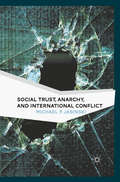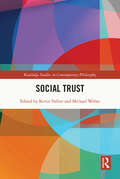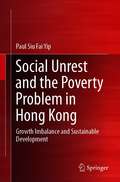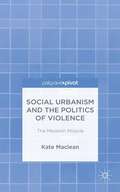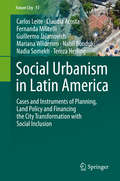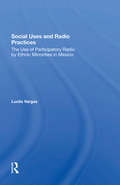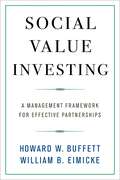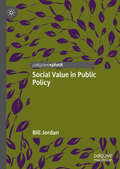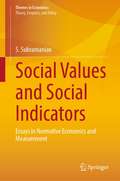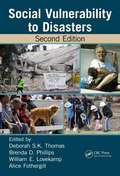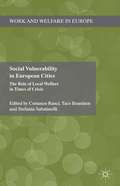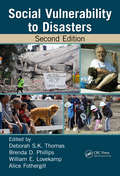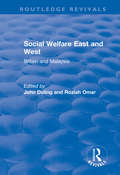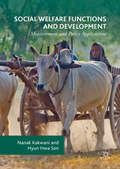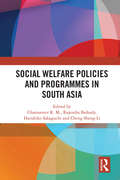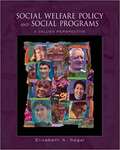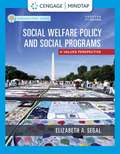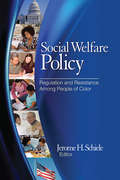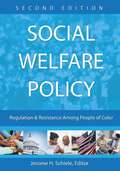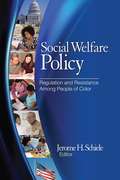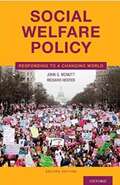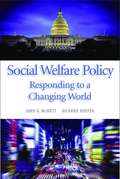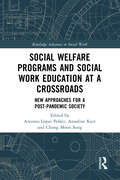- Table View
- List View
Social Trust, Anarchy, and International Conflict
by Michael P. JasinskiChallenges the democratic peace and diversionary war theories by emphasizing the importance of social trust, its origin as a by-product of effective governance exercised by strong states, and influence on international conflict.
Social Trust: Foundational and Philosophical Issues (Routledge Studies in Contemporary Philosophy)
by Kevin VallierWith increasingly divergent views and commitments, and an all-or-nothing mindset in political life, it can seem hard to sustain the level of trust in other members of our society necessary to ensure our most basic institutions work. This book features interdisciplinary perspectives on social trust. The contributors address four main topics related to social trust. The first topic is empirical and formal work on norms and institutional trust, especially the relationships between trust and human behaviour. The second topic concerns trust in particular institutions, notably the legal system, scientific community, and law enforcement. Third, the contributors address challenges posed by diversity and oppression in maintaining social trust. Finally, they discuss different forms of trust and social trust. Social Trust will be of interest to researchers in philosophy, political science, economics, law, psychology, and sociology.
Social Unrest and American Military Bases in Turkey and Germany since 1945
by Amy Austin HolmesOver the past century, the United States has created a global network of military bases. While the force structure offers protection to U. S. allies, it maintains the threat of violence toward others, both creating and undermining security. Amy Austin Holmes argues that the relationship between the U. S. military presence and the non-U. S. citizens under its security umbrella is inherently contradictory. She suggests that the while the host population may be fully enfranchised citizens of their own government, they are at the same time disenfranchised vis-. . . -vis the U. S. presence. This study introduces the concept of the "protectariat" as they are defined not by their relationship to the means of production, but rather by their relationship to the means of violence. Focusing on Germany and Turkey, Holmes finds remarkable parallels in the types of social protest that occurred in both countries, particularly non-violent civil disobedience, labor strikes of base workers, violent attacks and kidnappings, and opposition parties in the parliaments.
Social Unrest and the Poverty Problem in Hong Kong: Growth Imbalance and Sustainable Development
by Paul Siu YipThis book discusses the policy and public health challenges in Hong Kong from the perspective of economic and social welfare challenges, specifically focusing on the poverty and inequality research supported by the Hong Kong Jockey Club (HKJC) Charities Trust. Conducted by Prof Yip and his research team at the HKJC’s Centre for Suicide Research and Prevention at the University of Hong Kong across a five-year period, the book presents analyses based on high quality statistical data to explore some of the socioeconomic roots of the civil unrest in 2019, while also acknowledging the limitations and challenges of trying to build a stronger society under the constraints of the One Country Two Systems policy. Building on extensive research done by the research team and some governmental data, it provides concrete, evidence-based suggestions for reducing poverty in a high-income society, which are useful not only for Hong Kong but also for other societies experiencing similar challenges. It makes an original contribution to research into inequalities, poverty and social policies, and will be of interest to those seeking to understand the ongoing political challenges in Hong Kong and how they relate to the socioeconomic challenges and policies that affect the everyday lives of ordinary people there. It is relevant to academics, students and policymakers concerned with social inequalities and policy intervention.
Social Urbanism and the Politics of Violence: The Medellín Miracle
by Kate MacleanMedellin, Colombia, used to be the most violent city on earth, but in recent years, allegedly thanks to its 'social urbanism' approach to regeneration, it has experienced a sharp decline in violence. The author explores the politics behind this decline and the complex transformations in terms of urban development policies in Medellin. "
Social Urbanism in Latin America: Cases and Instruments of Planning, Land Policy and Financing the City Transformation with Social Inclusion (Future City #13)
by Carlos Leite Claudia Acosta Fernanda Militelli Guillermo Jajamovich Mariana Wilderom Nabil Bonduki Nadia Somekh Tereza HerlingThis book highlights current concepts of Social Urbanism, the contemporary set of multiple and interdisciplinary urban studies that have emerged mainly from the complex realities of Latin American cities. The discussion that follows places special emphasis on public land policy and the innovative urban instruments developed in that region to promote social and territorial inclusion. Critical reflections throughout the pages of this book shed light into the local context of each case-study in order to understand their specific set of challenges and opportunities. Relevant lessons are extracted from the three cities here analyzed, the medium-scale city of Medellin, the large-scale city of Bogota, and the megacity of Sao Paulo, as well as from local innovative experiences in Argentina and Uruguay. These cities underwent promising transformation processes over two decades, applying planning and financing instruments of land policy which have produced significant shifts in the urban development paradigm in the region. The quest for social inclusion has emerged as the common denominator in these cities, awakening growing interest across several fields of urban studies, from public policies and city management to urban law, city financing, urban development, and innovative community participation processes. The book brings implications on urban land policy for transition cities in the Global South. The question of social inclusion in Global South cities is however far from being solved; the analysis presented in this book shows advances and hope, besides a long path still ahead, which can only be faced through a continuous and challenging incremental process. May this book be an incremental step.
Social Uses And Radio Practices: The Use Of Participatory Radio By Ethnic Minorities In Mexico
by Lucila VargasThis book is about the social value of participatory or communityoriented radio and stresses how the politics of race, ethnicity, class, and gender shapetheextentand quality of people's participation in development efforts. It shows, ethnographically, how a number of Mexican ethnic minorities use the communication resources made available to them by a network of radio stations sponsored by the federal government through its lnstituto Nacional lndigenista (INI).
Social Value Investing: A Management Framework for Effective Partnerships
by William B. Eimicke Howard W. BuffettSocial Value Investing presents a new way to approach some of society’s most difficult and intractable challenges. Although many of our world’s problems may seem too great and too complex to solve — inequality, climate change, affordable housing, corruption, healthcare, food insecurity — solutions to these challenges do exist, and will be found through new partnerships bringing together leaders from the public, private, and philanthropic sectors.In their new book, Howard W. Buffett and William B. Eimicke present a five-point management framework for developing and measuring the success of such partnerships. Inspired by value investing — one of history’s most successful investment paradigms — this framework provides tools to maximize collaborative efficiency and positive social impact, so that major public programs can deliver innovative, inclusive, and long-lasting solutions. It also offers practical insights for any private sector CEO, public sector administrator, or nonprofit manager hoping to build successful cross-sector collaborations.Social Value Investing tells the compelling stories of cross-sector partnerships from around the world — Central Park and the High Line in New York City, community-led economic development in Afghanistan, and improved public services in cities across Brazil. Drawing on lessons and observations from a broad selections of collaborations, this book combines real life stories with detailed analysis, resulting in a blueprint for effective, sustainable partnerships that serve the public interest. Readers also gain access to original, academic case material and professionally produced video documentaries for every major partnerships profiled — bringing to life the people and stories in a way that few other business or management books have done.
Social Value in Public Policy: Social Value In Public Policy
by Bill JordanThis book considers the role of social value in the making and implementation of public policy, taking into account how concepts such as subjective well-being (SWB) can be used to measure the expected impact of enacted policies. It argues that there is no evidence that markets have contributed to greater well-being, and that moments of crisis, such as the COVID-19 pandemic, represent an opportunity to re-orientate policymaking and policy implementation away from those which favour markets, and towards those which place subjective well-being at their core. Following this premise, the author explores the elements that should be considered in a future society that prioritises social value.
Social Values and Social Indicators: Essays in Normative Economics and Measurement (Themes in Economics)
by S. SubramanianThe book is a collection of essays written since 2010, and dealing, in one way or another, with the place of values in economic analysis. The centrality of values in the collection is not surprising, given that the thematic concerns informing the essays in the book relate principally to methodological issues in economic enquiry, to the normatively constrained aggregation of personal preferences into collective choice, and to problems of logical coherence and ethical appeal in the axiom systems underlying the measurement of economic and social phenomena such as poverty, inequality and literacy. While many of the essays are more or less technical in nature, they are all explicitly motivated by considerations that go beyond the formalisms of presentation to an involvement with the role of moral reasoning in economic analysis. In particular, the essays emphasize the importance of ‘ought propositions’ in a science which is all too often regarded as being wholly and exclusively ‘positive’ in its orientation. The book should be of particular interest to researchers, students, and public policy makers.
Social Vulnerability To Disasters (Second Edition)
by Alice Fothergill Deborah S. K. Thomas Brenda D. Phillips William E. LoveKampThe 2010 Haiti and Chili earthquakes, the 2010 BP oil spill in the Gulf of Mexico, and the 2011 Fukushima earthquake and tsunami in Japan are but a few examples of recent catastrophic events that continue to reveal how social structure and roles produce extensive human suffering and differential impacts on individuals and communities. These events bring social vulnerability to the forefront in considering how disasters unfold, clearly revealing that disasters are not created from the physical event alone. Equally important, people—even those considered vulnerable—respond in innovative and resilient ways that unveil the strength of human ingenuity and spirit. It is not a foregone conclusion that a hazard event, even a large one, will result in catastrophic loss.
Social Vulnerability in European Cities
by Costanzo Ranci Taco Brandsen Stefania SabatinelliWhat has been the impact on social cohesion of contemporary cities in Europe, of the rise of new social risks and of the recent economic crisis? Focussing on 20 European urban contexts, this book provides an empirical analysis of the socio-economic transformations driving the emergence of new social risks and of the capacity of welfare policies.
Social Vulnerability to Disasters
by Alice Fothergill Brenda D. Phillips Deborah S.K. Thomas William E. LovekampThe 2010 Haiti and Chili earthquakes, the 2010 BP oil spill in the Gulf of Mexico, and the 2011 Fukushima earthquake and tsunami in Japan are but a few examples of recent catastrophic events that continue to reveal how social structure and roles produce extensive human suffering and differential impacts on individuals and communities. These events
Social Welfare East and West: Britain and Malaysia (Routledge Revivals)
by John Doling Roziah OmarThis title was first published in 2000: An exploration of the ways in which social welfare in two countries, half a world apart, may have similarities. Through identification of the differences and similarities of social welfare in Britain and Malaysia, the editors hope that we may be able to learn from one another as well as to contribute to debates both in our countries about how to respond to globalization and about global social policy. Accordingly, the contributors arranged themselves into pairs - one Malaysian, one British - to write reviews of one of each of the six areas of social welfare. Along with an opening chapter in which the aim was to identify a number of frameworks and issues that would allow the rest to be put into a context, the 12 chapters, each restricted to around 5000 words, provide a service-by-service account.
Social Welfare Functions and Development
by Nanak Kakwani Hyun Hwa SonNanak Kakwani and Hyun Hwa Son make use of social welfare functions to derive indicators of development relevant to specific social objectives, such as poverty- and inequality-reduction. Arguing that the measurement of development cannot be value-free, the authors assert that if indicators of development are to have policy relevance, they must be assessed on the basis of the social objectives in question. This study develops indicators that are sensitive to both the level and the distribution of individuals' capabilities. The idea of the social welfare function, defined in income space, is extended to the concept of the social well-being function, defined in capability space. Through empirical analysis from selected developing countries, with a particular focus on Brazil, the authors shape techniques appropriate to the analysis of development in different dimensions. The focus of this evidence-based policy analysis is to evaluate alternative policies affecting the capacities of people to enjoy a better life.
Social Welfare Policies and Programmes in South Asia
by Channaveer R. M. Rajendra Baikady Haruhiko Sakaguchi Cheng Sheng-LiThis book examines the social welfare policies and programmes devised to address different societal issues and concerns across the South Asian countries. It focuses on the design and delivery of social welfare policies related to women, children, the elderly and groups living below poverty level. It brings a wide array of themes to the fore – empowerment of vulnerable populations, globalization and inclusive development, intervention in Northeast India, employment of elderly teachers in Sri Lanka, regulations in prisons, ageing South Asia and elderly care, social exclusion and urban poor, girl child education in India, child protection in Bangladesh and women panchayat leaders – to provide an evidence-based understanding of social policy formulation, implementation and monitoring in South Asia. Comprehensive and topical, this volume will be useful to scholars and researchers of political studies, sociology, development studies and public policy, and also to practitioners and those in the development sector, NGOs and think tanks.
Social Welfare Policy and Social Programs: A Values Perspective
by Elizabeth A. SegalOffering a new values perspective, Elizabeth Segal's SOCIAL WELFARE POLICY AND SOCIAL PROGRAMS takes the student beyond identifying, describing, and analyzing social welfare policies. Segal demonstrates how the myriad values of diverse groups in America have influenced current policies, and helps students recognize that analysis takes place through the lens of these often opposing values. The dual themes of critical thinking and critical evaluation provide the framework of the book, and Segal's unique attention to international perspectives on values around social welfare policies and social programs heightens students' awareness of the global implications of social work around the world.
Social Welfare Policy and Social Programs: A Values Perspective
by Elizabeth A. SegalThis book is a comprehensive introductory social welfare policy text for both undergraduate and graduate students who are new to social work and human services. The book will help students to understand what drives social welfare policy and how it affects people's lives, and to gain insight into key issues of social concern. This book guides the reader through areas of social policy concern, including poverty, health care, child welfare, and aging, with a foundation of ideologies, theories, values, and beliefs to help explain our social welfare system. Each area is updated to reflect the latest policy developments. <p><p> This new edition includes detailed discussions of the key policies that have been enacted in recent years. The skills and resources necessary for teaching policy analysis are provided early in the book to better prepare students for analysis of the critical concerns that affect all aspects of social welfare policies and programs as they read through the rest of the book. Infused throughout the book are references to the Council on Social Work Education's Educational Policy and Accreditation Standards (EPAS).
Social Welfare Policy and Social Programs: A Values Perspective
by Elizabeth A. SegalOffering a new values perspective, Elizabeth Segal's SOCIAL WELFARE POLICY AND SOCIAL PROGRAMS takes the student beyond identifying, describing, and analyzing social welfare policies. Segal demonstrates how the myriad values of diverse groups in America have influenced current policies, and helps students recognize that analysis takes place through the lens of these often opposing values. The dual themes of critical thinking and critical evaluation provide the framework of the book, and Segal's unique attention to international perspectives on values around social welfare policies and social programs heightens students' awareness of the global implications of social work around the world.
Social Welfare Policy: Regulation and Resistance Among People of Color
by Dr Jerome H. SchieleApplying the social control paradigm to people of color, this text uses a racism-centered perspective of social welfare policy analysis to examine how such policies have regulated the lives of people of color and then employs a strengths-based approach to describe how they have refused to go along with the oppressive features of these policies. It illuminates the need for culturally competent social welfare policy practitioners, illustrating how racism continues to be at the center of many contemporary social problems such as issues of employment, public and bilingual education, housing and residential patterns, citizens' rights, and affirmative action—and of the social welfare policies used to address these issues.This book is an ideal core or supplementary text for Social Policy courses in departments of social work or human services. It is also a must-read for social welfare policy advocates and analysts and for anyone interested in how the themes of social welfare policy regulation and resistance are relevant to people of color.
Social Welfare Policy: Regulation and Resistance Among People of Color
by Jerome H SchieleFeaturing chapters written by leading scholars in the social work discipline, the second edition of Social Welfare Policy: Regulation and Resistance among People of Color examines how American social welfare policies, both historical and current, have sought to control the lives of marginalized populations. The chapters also explore how people of color have organized to critique and resist the racial control aspects of these policies. Each of the book's four parts are devoted to the major groups of color in the United States: Native American or First Nation peoples; Hispanic or Latino/Latina Americans; Asian Pacific Americans; and African Americans. Contributors highlight how oppressive or racially regulatory social welfare policies have affected education systems, child protective services, spiritual and religious practices, immigration laws, incarceration rates, and foster care and adoption services. Readers learn how specific groups have countered these policies through collective resistance, advocacy for alternative policies, civil and political participation, and more.
Social Welfare Policy: Regulation and Resistance Among People of Color
by Jerome H. SchieleApplying the social control paradigm to people of color, this text uses a racism-centered perspective of social welfare policy analysis to examine how such policies have regulated the lives of people of color and then employs a strengths-based approach to describe how they have refused to go along with the oppressive features of these policies. It illuminates the need for culturally competent social welfare policy practitioners, illustrating how racism continues to be at the center of many contemporary social problems such as issues of employment, public and bilingual education, housing and residential patterns, citizens' rights, and affirmative action―and of the social welfare policies used to address these issues.
Social Welfare Policy: Responding To A Changing World
by Richard Hoefer John G. McNuttSocial Welfare Policy: Responding to a Changing World is a topical, comprehensive introduction to social welfare policy. It uses a contemporary framework that explicitly addresses three forces that have redefined the social policy arena: the growth of the information economy, the rise of globalization, and our current environmental crisis. This framework is applied to the six traditional arenas of policy--child and family services, health and mental health, poverty and inequality, housing and community development, crime and violence, and aging, and explores how to find solutions to both long enduring and brand new problems. John McNutt and Richard Hoefer's introductory text represents a move forward in social welfare policy thinking that is built on the latest scholarship and teaches students that the time to create social policies for the future is in the present.
Social Welfare Policy: Responding To A Changing World
by Richard Hoefer John G. McnuttSocial Welfare Policy: Responding to a Changing World is unlike other books used in social welfare policy courses. John McNutt and Richard Hoefer explicitly address the emerging information economy, the rise of globalization, and the developing environmental crisis, and provide a tightly integrated framework for understanding these forces and their impact on policy and practice. This framework is applied to the six traditional arenas of policy--child and family services, health and mental health, poverty and inequality, housing and community development, crime and violence, and aging--exploring how to find new solutions to problems both long enduring and brand new. There is an urgency to this text that is clearly communicated to readers--it is time for practitioners, researchers, and policy-makers to make decisions for the future based on the realities of the present.
Social Welfare Programs and Social Work Education at a Crossroads: New Approaches for a Post-Pandemic Society (ISSN)
by Antonio López Peláez Annaline Keet Chung Moon SungThis book explores a key phenomenon that has been accelerated by the COVID-19 crisis, namely, the crossroads at which social welfare professionals find themselves. This is a crossroads where, on the one hand, there is an accelerated digitalization process and a reorganization of social programs, while on the other hand, we are confronted by the basic challenge of designing social policies and their methods of evaluation, that is, the generation of robust data that will allow better evaluation of social projects and programs.Rigorously analyzing the crossroads at which social welfare programs find themselves and the new demands for the education of professionals involved in social welfare programs, several key issues can be discerned;• the theoretical debate surrounding the changes brought about by the COVID-19 pandemic and the process of redefining globalization in which we are immersed.• the challenges to be met by welfare programs, and the good practices that are being implemented.• the key issue of how to generate more robust data in the field of social services and social protection.• how to increase the competencies of professionals through education in schools of social work.Providing 15 newly written chapters drawn from both the global north and the global south, it offers a set of recommendations to address the challenges of inequality and social inclusion in the coming years.It will be of interest to all academics, students and practitioners working in the fields of social work, social welfare and social development.
